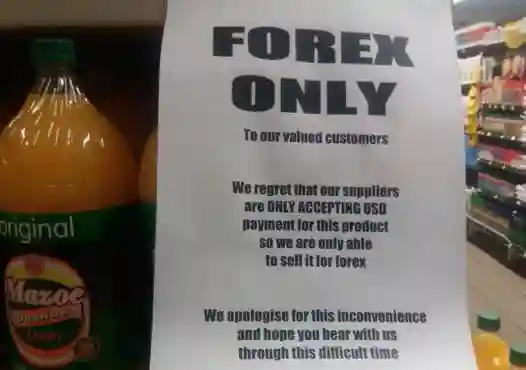Finance and Economic Development Minister, Professor Mthuli Ncube Tuesday said the government would not hesitate to withdraw trading licences of businesses that were selling their commodities exclusively in United States dollars.
This comes after Schweppes Zimbabwe Limited had indicated that it was selling some of its products exclusively in USD despite paying no duty on imported oranges and grapefruits.
Speaking during a post-Cabinet media briefing in Harare, Ncube said:
We are quite aware that some retailers are putting stickers to say this product can only be bought in US dollars. I want to make it clear and categorical that it is totally unacceptable, and as a government, we will not allow that.
We will withdraw licenses, and already we have withdrawn the duty rebate licenses so as to allow companies to import. We will not allow this. They are breaking the law. The law says that citizens or anyone approaching a shop should be able to use currencies within the multi-currency regime. We absolutely cannot tolerate this kind of nonsense.
Retailers and wholesalers have been charging selected products such as sugar, milk, cooking oil and others in US dollars saying they were ordering the products from manufacturers in US dollars.
Analysts say the local market was self-dollarising raising fears that the local currency could be ditched again.
The Reserve Bank of Zimbabwe (RBZ) is against the idea of fully dollarising saying it would worsen the scarcity of foreign currency as the case was around 2016.
RBZ chief, John Mangudya recently said:
We do feel the pain of this economy and because we feel the pain of this economy that is why we are doing all we think is necessary for this economy to recover.
This economy has no capacity to fully dollarise. The preference might be there, which is emotional. I feel the emotion but the capacity to re-dollarise this economy is not there.
Zimbabwe will become a supermarket economy (if the country re-dollarises). We have been there before and that journey is a painful journey which as a governor of the Central Bank I will not propose to the August House. It is an easy way out, but the wrong way out.
Zimbabwe imports most of the goods and services consumed locally hence the high demand for foreign currency. Analysts say the anomaly can only be corrected by reviving the collapsed local industry.

